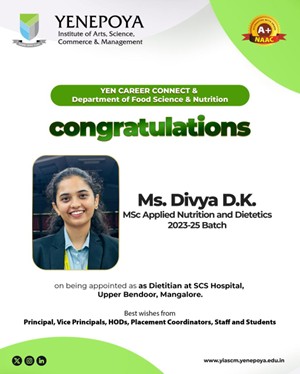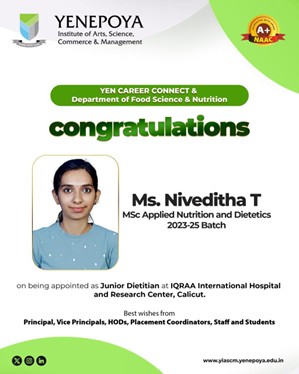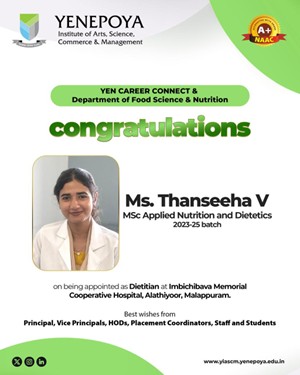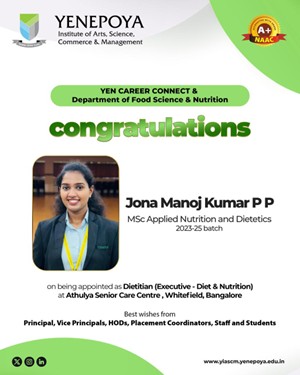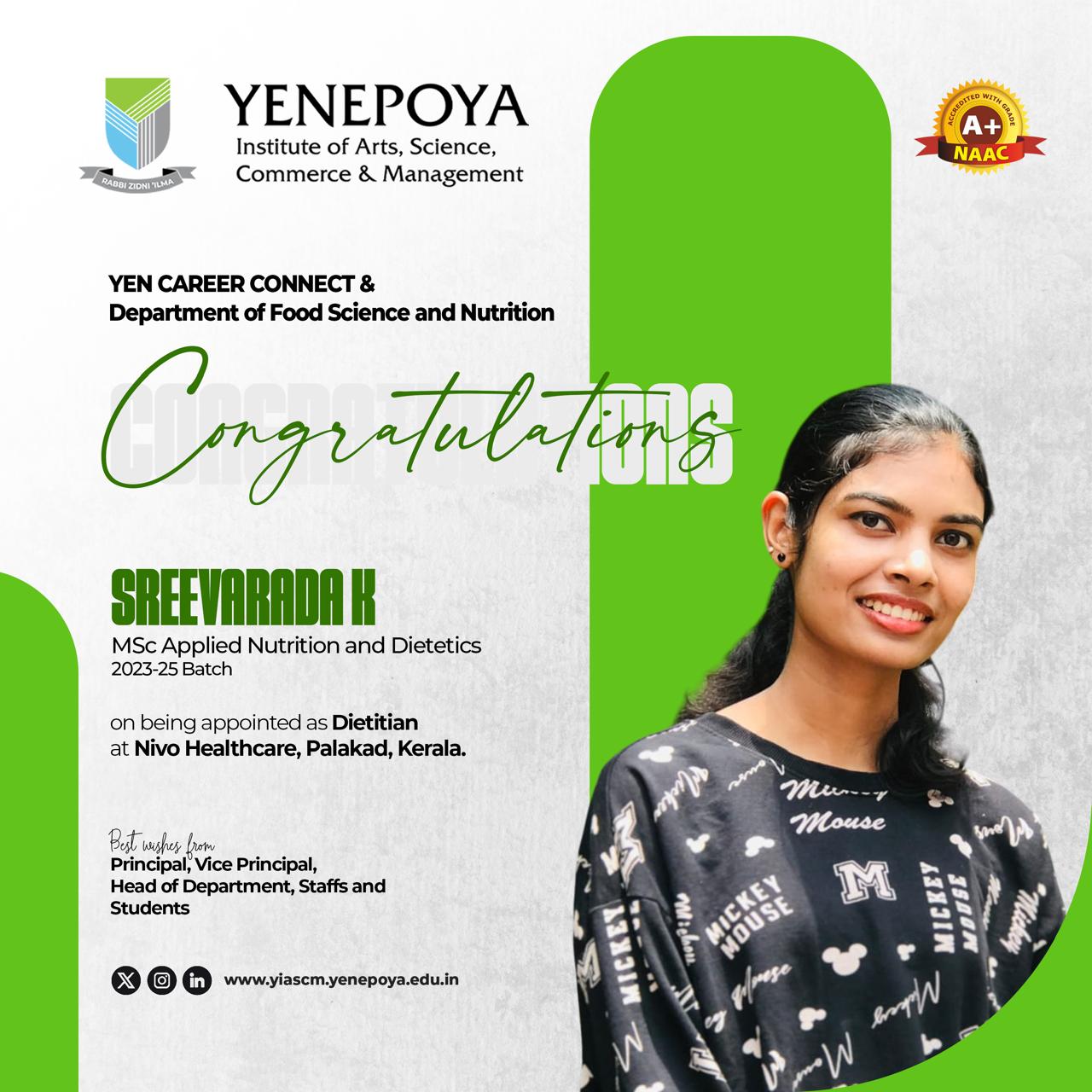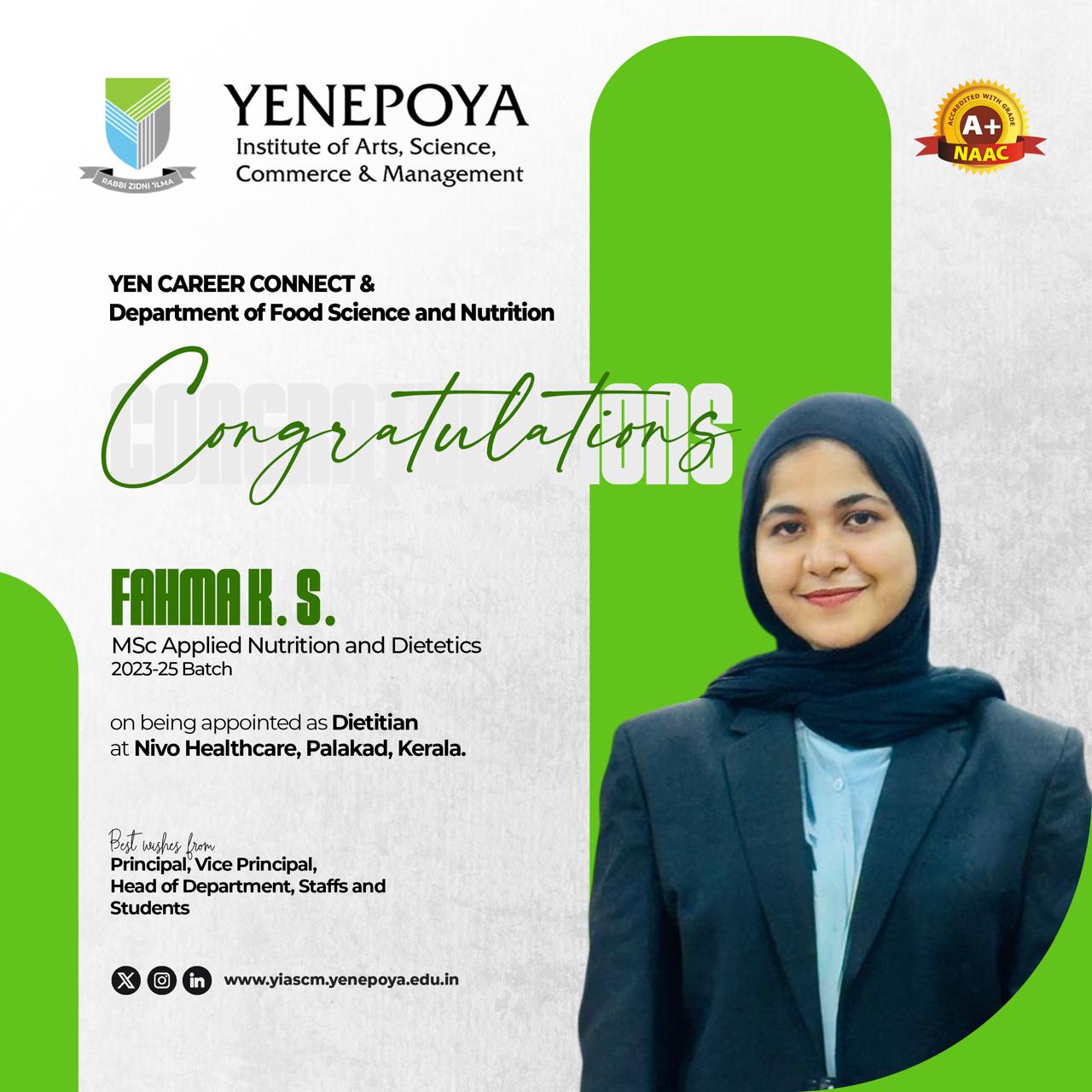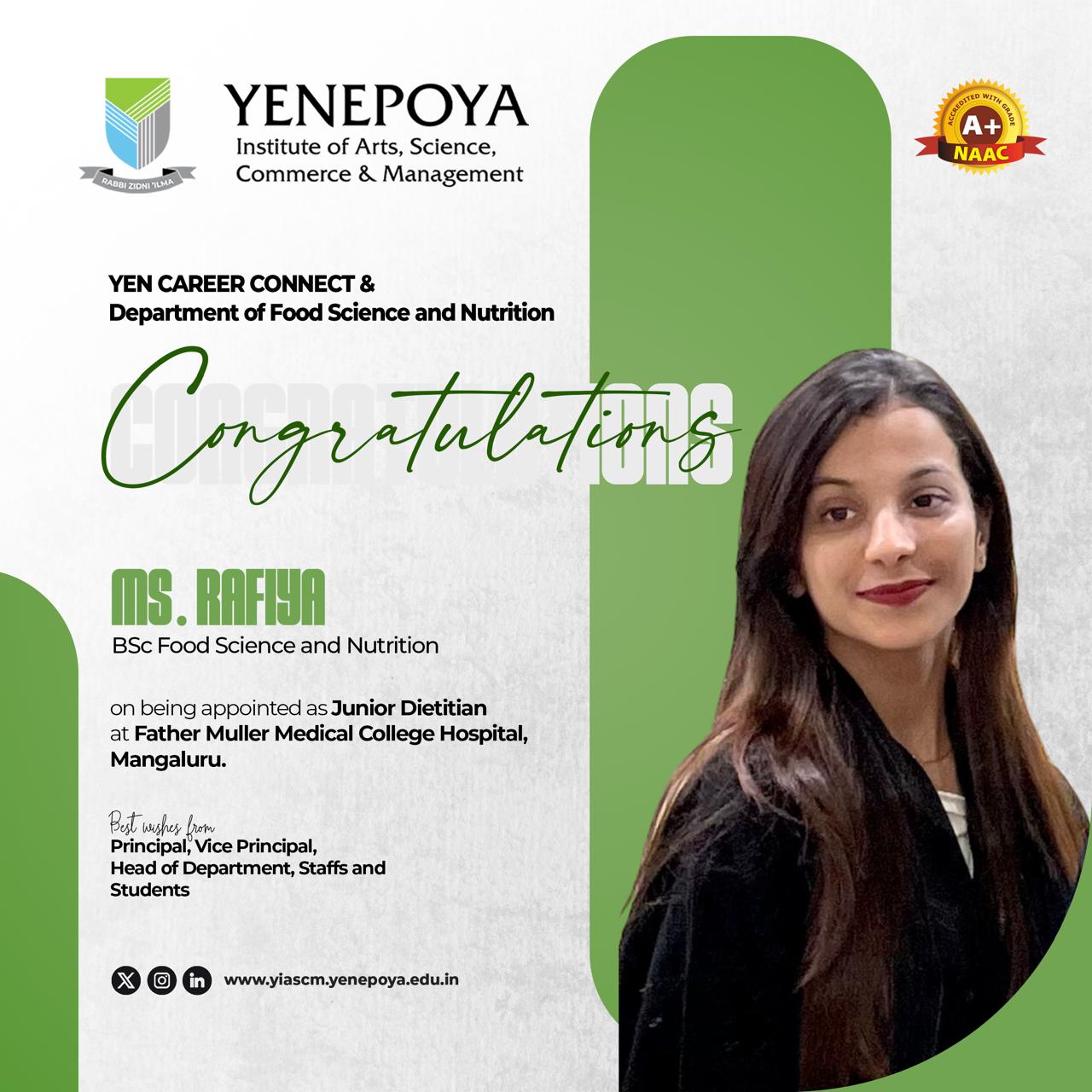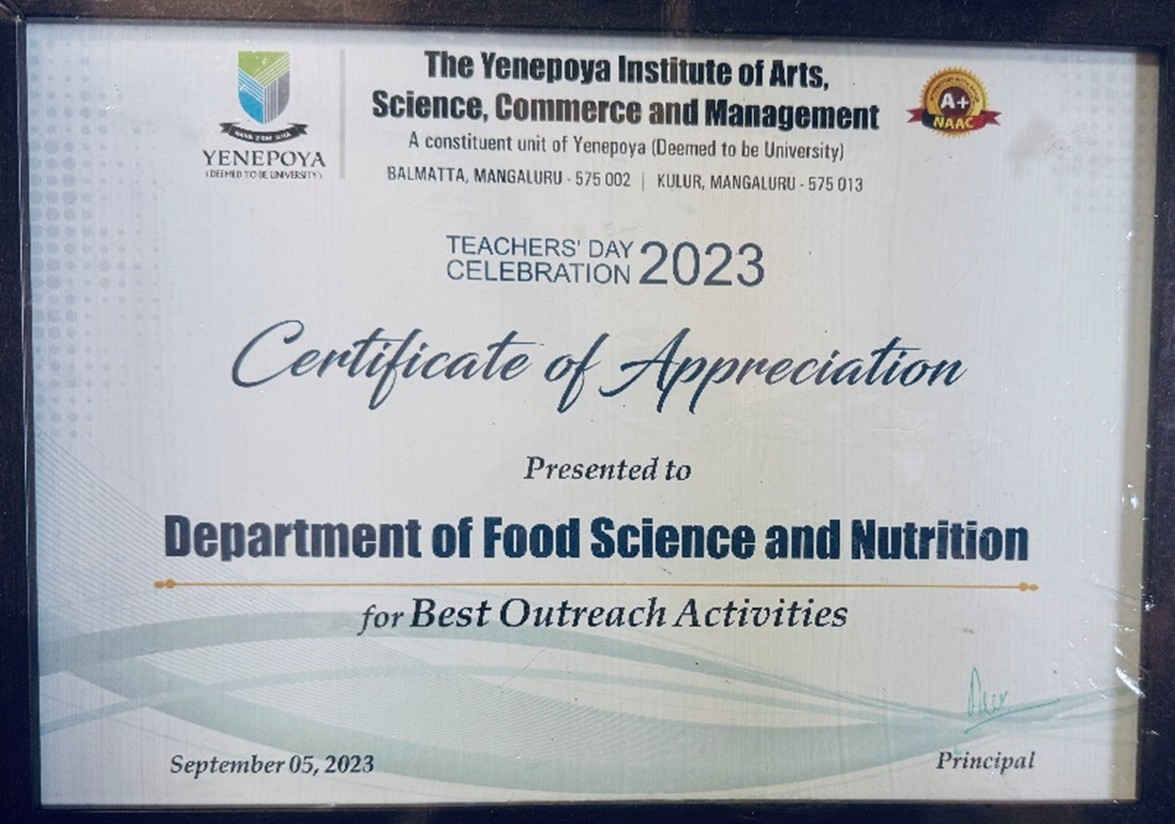Department of Food Science Nutrition
The Department of Food Science and Nutrition was established in 2020 with the vision of promoting education and research in the field of food, health, and nutrition. It aims to equip students with the knowledge and skills needed to address current challenges in food safety, nutritional health, and sustainable food systems. The department offers four-year undergraduate programme, B.Sc. (Honours/ Honours with Research) in Food Science, Nutrition and Dietetics and two-year postgraduate programmes such as M.Sc. Applied Nutrition and Dietetics as well as M.Sc. Food Technology. The department boasts a well- equipped laboratory, providing students with hands-on experience. Guided by a team of experienced and dedicated faculty members, the department ensures a strong practical foundation alongside theoretical knowledge, fostering a conducive environment for learning and innovation.
Bachelor of Science (B.Sc.) (Honours/ Honours with Research) in Food Science, Nutrition and Dietetics
Need for the Programme
The increasing interest in healthy living, rapid advancement in the field of food science, food security challenges, public health concerns lead for the need for a B.Sc. Food Science, Nutrition and Dietetics programme where it prepares the students to face challenges in the expanding field of Food Science, Nutrition and Dietetics.
Programme Objectives
The Yenepoya (Deemed to be University) offers B.Sc. in Food Science, Nutrition and Dietetics with the following objectives:
- Fundamental Knowledge Accession: Establish a strong understanding of core concepts in food microbiology, nutrition, diet therapy, and food processing.
- Applied Skill Development: Gain hands-on experience in food analysis, product development, nutritional assessment, sensory evaluation, and dietary counselling.
- Creativity and Critical Thinking: Enhance the ability to analyse nutritional challenges, apply evidence-based solutions, and innovate in food and health sectors.
- Flexibility: Supports multiple entry-exit options as per NEP 2020 and NSQF, allowing learning at one’s own pace and re-entry for skill upgrading.
- Interdisciplinary and multi-disciplinary knowledge:Develop the ability to work across fields like healthcare, food technology, and public health through a multidisciplinary approach.
- Enhance employability: Equip students for diverse roles in the food industry, healthcare, public health agencies, research institutions, and education sectors.
- Professional Ethics and Communication: Promote ethical awareness, empathy, teamwork, and effective communication for success in professional environments.
Programme USP
- Comprehensive Curriculum: Blend of foundational knowledge in food science, nutrition, and dietetics along with hands-on practical learning and research opportunities.
- Practical Skills: The program emphasizes both theoretical understanding and practical skills in areas like human physiology, nutritional biochemistry, dietetics, nutrition through lifecycle, and other related core areas.
- Specialized Tracks: Options to specialize through Honours with Research, focusing on advanced nutrition, dietetics, and food science cutting-edge research.
- Industry Integration: Focus on industry-based learning and real-world applications ensures that graduates are well-prepared for careers in healthcare, food industries, and research sectors.
Career Outcomes
The curriculum framework of B.Sc. in Food Science, Nutrition and Dietetics (Honours/ Honours with Research) focuses on practical application of theoretical concepts which is taught with substantial coverage of practical and field works. The platform aims at equipping the graduates with necessary skills for Food Science, Nutrition and Dietetics related careers, with general graduate-level aptitude and for higher education in Food Science or Nutrition or allied subjects. This programme provides a wide range of career opportunities across various sectors like food industries as quality assurance manager; nutrition and dietetics field like nutritionist/ dietitian; healthcare settings as health educator/ nutrition consultant/ public health nutritionist; research and academia as research scientist or as academician and also as food entrepreneur to play their role in useful manner for the development and welfare of the society. Students can also progress to higher education and take up postgraduate Programmes in various disciplines of Food Science, Nutrition and Dietetics.
M.Sc. Applied Nutrition and Dietetics
Need for the Programme
The M.Sc. Applied Nutrition and Dietetics addresses the increasing demand for qualified professionals who can apply advanced nutritional science to promote health and prevent diseases. This programme trains the students to assess nutritional needs, design personalized dietary plans, manage nutrition-related issues across healthcare and related fields as well as they can focus on the development of novel food products to cater the need of the general public through food and nutraceutical industry and related fields. With a focus on evidence- based practice and interdisciplinary collaboration, graduates are prepared to address complex health challenges and contribute to improving public health outcomes at regional, national and global levels.
Programme Objectives
The objectives of M.Sc. in Applied Nutrition and Dietetics programme are as follows:
- Advanced Knowledge of Nutrition Science: Build a strong foundation in nutrition, biochemistry, physiology, and metabolism to address diverse nutritional needs.
- Clinical Nutrition Skills: Develop the ability to assess nutritional status and design personalized diet plans in hospitals and clinical settings.
- Community Nutrition and Public Health: Learn to plan and implement nutrition education and interventions in community and public health environments.
- Food Service Management: Gain expertise in menu planning, food safety, quality control, and operational management in food service settings.
- Research and Evidence-Based Practice: Enhance critical thinking and research abilities for evaluating studies and applying evidence-based nutrition practices.
- Professional Development: Strengthen communication, leadership, ethics, and cultural competence for diverse professional environments.
- Industry-Relevant Skills: Receive hands-on training in nutrition counselling, dietary assessment, and skills aligned with healthcare and industry needs.
Programme USP
The M.Sc. in Applied Nutrition and Dietetics offers a unique blend of advanced coursework, practical exposure, internships and research opportunities tailored to the growing demand across healthcare, sports, public nutrition, food and nutraceutical industries. It provides specialized tracks, allowing students to focus on their area of interest, whether clinical, community, sports nutrition along with research. The programme furnishes the graduates with the expertise to address contemporary nutrition challenges and contribute to health innovations and policy development.
Career Outcomes
TThe curriculum framework of M.Sc. in Applied Nutrition and Dietetics focuses on practical application of the theoretical aspects which is taught through practical, experiential learning and internship. The curriculum is also designed to provide interdisciplinary and applied platform in their career. The career outcomes of this programme are diverse and varied providing an excellent career opportunity in the field of healthcare, food production and service sectors as well as research. Graduates have various career paths such as clinical dietitian/ nutritionist in hospitals, clinics or personalized nutrition counselling; community nutritionist/ public health nutritionist in public health agencies, non- profit organizations and government sectors; food service manager/ food service director in food service settings like hospitals, food and nutraceutical industries; nutrition scientist/ researcher in research institutions, universities or pharmaceutical companies; corporate wellness specialist within corporate settings; nutrition educator in community centers or as entrepreneur the graduates may start their consulting firms or entrepreneurial ventures other than teaching in academic institutions and pursuing higher studies in the specialized areas of nutrition and dietetics.
M.Sc. Food Technology
Need for the Programme
The M.Sc. in Food Technology arises from the growing global demand for safe, nutritious, and sustainable food solutions amidst challenges such as population growth, food security, and environmental concerns. With rapid advancements in food science, technology, and production methods, there is a critical need for skilled professionals who can innovate, improve food quality, and ensure safety standards across the food industry. This programme addresses these needs by equipping students with the expertise to tackle modern challenges in food processing, product development, and sustainability, making them essential contributors to the evolving global food landscape.
Programme Objectives
- In-depth Knowledge of Food Science: Provide a strong foundation in food chemistry, microbiology, and processing technologies.
- Mastery of Food Processing Techniques: Equip students with skills in modern food processing methods and equipment.
- Food Safety and Quality Assurance: Emphasize safety standards, regulatory compliance, and quality control in food production.
- Innovation in Product Development: Encourage creativity in developing new food products that meet consumer needs and market trends.
- Research and Problem Solving: Foster analytical thinking and research skills to address real-world challenges in the food industry.
- Industry Readiness: Blend theory with practical training to prepare students for leadership roles in food tech and related sectors.
Programme USP
The M.Sc. in Food Technology stands out for its comprehensive curriculum that combines cutting-edge food science, innovative processing techniques, and a strong emphasis on sustainability and food safety. The programme offers hands-on learning through practical components and exposure to real-world challenges through internship. With a focus on the latest technological advancements and global food trends, it equips graduates with the practical skills and knowledge needed to drive innovation and address critical issues in the food industry, making them highly competitive in the job market.
Career Outcomes
The M.Sc. in Food Technology have a wide range of career opportunities in both the food industry and research sectors. They can pursue roles in food processing, product development, quality control, and food safety management with leading food manufacturers, research institutions, and regulatory bodies. Other career paths include working in food packaging, supply chain management, and the emerging field of food innovation, focusing on sustainable and functional food products. Graduates can also engage in entrepreneurship by starting food related businesses or consulting. Additionally, the programme opens avenues for further academic research or teaching roles in the field of Food Science and Technology.
Ph.D. in Food Science and Nutrition programme
NutriGene is created under the Department of Food Science and Nutrition as a Departmental Association which aims to promote excellence in the fields of food science, nutrition, and dietetics by fostering collaboration, knowledge exchange, and skill development among undergraduate and postgraduate students.
Vision:
To be a leading association dedicated to promoting excellence in the fields of food science, nutrition, and dietetics, fostering innovation, and advancing professional development for students and practitioners alike.
Mission:
To facilitate collaboration, knowledge exchange, and skill development among undergraduate and postgraduate students in the disciplines of food science, nutrition, and dietetics. Through a range of programs and initiatives, we aim to empower our members to excel academically, professionally, and ethically, contributing positively to society's health and well-being.
Programmes conducted under NutriGene
- Inauguration of the NutriGene Association – 10 th July, 2024
- Guest Talk on “Career Opportunities in the Field of Food Science, Nutrition and Dietetics” by Mr. Manish, Associate Nutritionist, HealthifyMe – 10 th July, 2024
- NutriGen 2.0, National Nutrition Week 2024 – 2 nd to 6 th September, 2024
- Guest Talk on “Healthy Eating Habits and Lifestyle” under Poshan Abhiyan initiative by Dr. Pavithra M., Assistant Professor III, PG Coordinator and HoD (I/C), Department of Food Science and Nutrition, YIASCM at GHP School, Panjimogaru in association with NSS Unit 10 – 20 th September, 2024
- Guest Talk on “Healthy Eating Habits and Lifestyle” under Poshan Abhiyan initiative by Dr. Pavithra M., Assistant Professor III, PG Coordinator and HoD (I/C), Department of Food Science and Nutrition, YIASCM at GHP School, Panjimogaru in association with NSS Unit 10 – 20 th September, 2024
- Industrial Visit to Tasty World Food Factory, Amble, Chikkamagaluru – 9 th December, 2024
- Nutrition Counselling and Education for Older Adults at Olavina Halli Rehabilitation and Community Development, Talapady – 18 th December, 2024
- Guest Talk by Dr. Anu Appaiah K.A., Co-Founder and Technical Consultant, Salutory Nutrifoods; Sr. principal Scientist (Rtd.), CSIR-CFTRI, Mysore on “Food Laws – It’s Implications on Nutraceuticals” and by Dr. Sushma Appaiah, Founder Director of Salutory Nutrifoods and Golz-Nutrition and Diet Solutions, Mysore on “Personalized Nutrition – An Insight to Newer Perspectives” – 4 th January, 2025
- Skill Development Program by Ms. Flona Soans, Dean-Training, Placement and Careers (TPC), St. Aloysius (Deemed to be University), Mangaluru – 23 rd March, 2025
- Industrial Visit to Bio-Med Ingredients Private Limited and Goa State Co-operative Milk Producers’ Union Limited, Goa – 28 th and 29 th , April, 2025
- Academic visit to Central Plantation Crop Research Institute (CPCRI), Kasaragod – 12 th June, 2025
- NutriGen 3.0, Nutrition Week, 2025 – 22 nd to 26 th September, 2025.
Undergraduate Programmes
Postgraduate Programmes
Ph.D. Programme
Teaching Faculties
Non-Teaching Faculties
Syllabus
coming soon . . .
coming soon . . .











